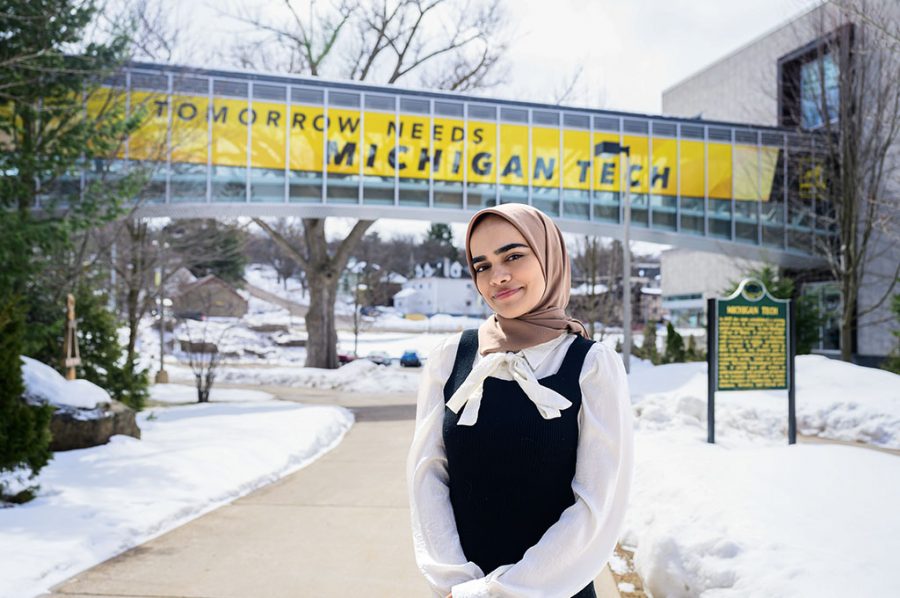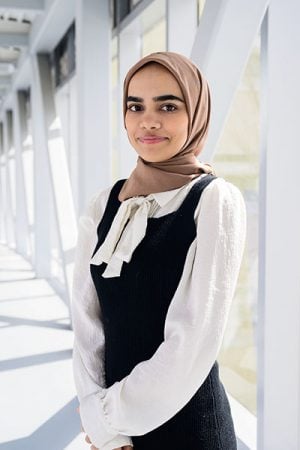
Tabasum Hamdard didn’t know anyone when she arrived at Michigan Tech to pursue a master’s degree in data science. When she takes the podium as the graduate student speaker at commencement exercises on Friday, April 24, there will be as many familiar faces in the crowd as there are memories of a community that welcomed her in and challenged her to accomplish her dreams.
Hamdard, who is also receiving a graduate certificate in applied statistics, made the most of her time at Tech. through her studies in the College of Computing and her work. Her roles included a seat on the editorial board of the college’s student-led undergraduate journal Infinite Loop, a position as an office assistant in the Michigan Tech Graduate School, and as a Summer Youth Programs (SYP) residence counselor.
Commencement Countdown
Graduate student commencement speaker Tabasum Hamdard will address fellow Huskies during the commencement ceremony at 3 p.m. on Friday, April 25 in the John J. MacInnes Student Ice Arena in the University’s Student Development Complex. For more information, visit Michigan Tech’s Commencement website.
“The Infinite Loop was the first job I got at Michigan Tech,” she says. “I got involved through Dr. Leo Ureel, who was leading it. It’s a journal that gives space for undergrads to publish their research, projects, or anything they’re working on in computing and related fields. I thought it was a really cool way to show what students are capable of outside of just regular coursework.”
Ureel’s support of students and their projects stood out. “I liked the way he worked and how involved he was, so I ended up taking one of his classes, too,” she says.
Moving her career concentration more heavily into the field of computing hadn’t been top of mind for Hamdard when she was earning her bachelor’s degree at American University of Afghanistan in Kabul.
“After studying IT for my undergrad and spending some time working in the business sector, I started an MBA thinking that might be the right next step,” she says. “But I realized things weren’t adding up. I wanted something more analytical—something that would let me ask deeper questions and actually understand how things work—to get to the ‘why’ of it, not just manage them.”
As she further explored options, which included relocating, the pieces came together.
“I’ve loved math since high school, and the more I learned about data science, the more it felt like the right fit. It brought together everything I was looking for: the structure of math, the curiosity of problem-solving, and the potential to make an impact,” she says.
“To me, that’s what makes data science important. It helps us not just analyze the world, but actually improve it.”
In choosing to study data science, Hamdard also had a point to prove. “Growing up in Afghanistan, I always had a strong desire to pursue paths that weren’t common in our culture and to do things others hesitated to do. I believe that change begins with one person’s decision to step into the unknown. In my community, academic ambition was rarely prioritized for girls. Even in the most supportive families, the idea of women pursuing higher education, especially in technical fields, was seen as unnecessary or too difficult,” says Hamdard, whose hometown is Panjsher, Afghanistan. “But I knew that if even one woman did it and succeeded, others would follow. I’ve always believed that when you break a barrier, you don’t just open a door for yourself, you widen the path for others, too. That belief made me determined to pursue a challenging field like data science as it was still evolving, still expanding, and still in need of more voices to amplify it and make it more inclusive to others as well.”
Lessons Learned Beyond the Classroom
Hamdard’s ambitious educational endeavor took place while navigating a new personal reality.
“Starting over in a completely new environment was probably the biggest challenge. When I first arrived in the U.S., I didn’t know anyone, and I had to figure everything out on my own. I had to learn how to manage my time, take care of myself, and stay focused without a support system around me,” she says. “There were also moments when the loneliness felt heavy. I wasn’t expecting anyone to really be there for me, so I kept a lot to myself in the beginning. But when I finally started reaching out, I realized that people here were more supportive than I imagined. I got involved with some of the kindest people who truly cared.”
“All it took was asking for help, and that changed everything. I realized I didn’t have to carry everything alone and that was one of the most important lessons I learned during my time here.”
Hamdard, who serves as Michigan Tech’s ambassador for Women in Data Science Worldwide, says her favorite experiences at Tech center around “getting to know the coolest people,” including her team in the Graduate School office. “I genuinely enjoyed the environment because it never felt too formal or distant. Everyone treated each other with kindness and respect, and over time, they started to feel more like close friends or family,” she says. “That kind of support made a big difference during my time as a grad student.”
Working as an SYP resident counselor is another favorite experience. “I’ll admit, I thought it would be slightly terrifying to manage middle schoolers and teens. But I loved every second of it. The girls in my group were sweet, smart, and respectful. They even left me the kindest letters afterward, which I still keep to this day,” she says. “I only had one summer at Tech, and I’m really glad I spent it doing something so fun and memorable.”
Camaraderie also abounded off campus. Camping had long been on Hamdard’s bucket list. She joined the Outdoor Venture Crew, a student organization that puts together hiking and camping trips and made her wish come true.
“It was a little scary at first, but I loved the adrenaline and the adventure. It was definitely one of those unforgettable ‘I can’t believe I did that’ moments,” she says.
Also unforgettable: witnessing the Keweenaw’s aurora borealis show. “ The amount of joy I felt at that moment was unreal as I just stood there, completely in awe, not believing what I was seeing,” says Hamdard. “It’s a moment I’ll never forget. I still talk about it to people who think you can only see it in Iceland or Norway.”
Putting Data Science to Work Post-Graduation

The Husky family network will continue to influence Hamdard as she steps into her future. During her studies at Tech, she had the chance to connect with Robin Elston, a 1986 chemical engineering alumna, who is currently director of strategic improvements at Cooper Farms. “I’ve decided to work under her supervision as an intern, where I’ll be applying my data science skills in a real-world setting and continuing to learn from her experience and leadership,” Hamdard said.
But before she transitions to the next chapter, Hamdard looks forward to creating another Michigan Tech memory: delivering the graduate commencement address.
“I want to use this platform to remind people that our journey does not end with just getting a degree or starting a career. My experience here taught me that we carry a responsibility beyond ourselves,” she said. “If we are not here to help, to serve, and to reach out to those who need us, then what are we really here for?”
Hamdard acknowledges that tenacity alone didn’t get her to this milestone achievement. “My greatest support has always been my family, especially my parents. Even from a distance, they were the ones who encouraged me when things felt heavy and reminded me of why I started” she says.
Hamdard is also grateful to have been a recipient of the U.S. Embassy Scholars program in Afghanistan, which supported her undergraduate education, and her designation as a QSAP Scholar, which provided the opportunity to pursue her advanced studies. The latter program matches students with participating universities. “In a way, I didn’t choose Tech but I’m glad Tech chose me,” says Hamdard. “I didn’t know much about Tech before coming here, but over time it became a place where I found direction, purpose, and a community that helped me keep going.”
About the College of Computing
The Michigan Tech College of Computing, established in 2019, is the first academic unit in Michigan dedicated solely to computing, and one of only a handful such academic units in the United States. The college is composed of two academic departments. The Computer Science department offers four bachelor of science programs in computer science, cybersecurity, data science, and software engineering; four master of science programs in applied computer science, computer science, cybersecurity, and data science; and a doctoral program in computer science. The Applied Computing department offers four bachelor of science programs in cybersecurity, electrical engineering technology, information technology, and mechatronics; two master of science programs in health informatics and mechatronics; and a doctoral program is in computational science and engineering.Questions? Contact us at computing@mtu.edu.
Follow the College of Computing on Facebook, Instagram, LinkedIn and Twitter.